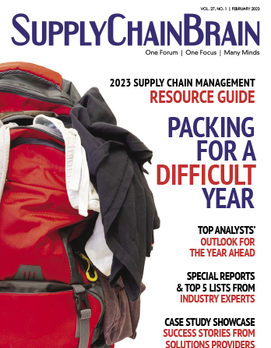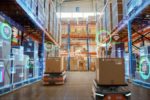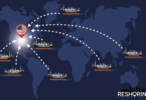
Home » Keeping Cool in the Consumer Products Supply Chain
Keeping Cool in the Consumer Products Supply Chain

August 26, 2013
Some consumer products are so ubiquitous that we assume they've been around forever. But the collapsible cooler, invented by California Innovations Inc., didn't hit the market until 1990.
Since then, of course, the item has become wildly popular. Even with the emergence of imitators, California Innovations - which, despite the name, is headquartered in Toronto, Ont. - remains the biggest seller of insulated, soft-sided products. Its line of around 1,000 SKUs includes the popular Arctic Zone brand, in addition to items made under license for Columbia Sportswear. Customers include just about every major retailer in the U.S., including Walmart, Target, Costco, Kmart and Walgreen's.
For all its success, California Innovations remains a relatively small company. Believing that it wasn't receiving the proper amount of attention from its global third-party logistics provider, it switched in 2005 to Weber Logistics, which specializes in operations within California and the western U.S.
Weber leased a 300,000 square-foot building in Fontana, Calif., on California Innovations' behalf. Strategically located near Interstates 10 and 15, the facility distributes product to customers throughout the country.
According to Dennis McDonough, vice president of client solutions, Weber receives between 20 and 30 forty-foot ocean containers from China a month. Product is held at the center and shipped out as orders come in. Among Weber's responsibilities is ensuring that the customer complies with all retailer specifications for shipment, so as to avoid expensive chargebacks.
Weber's expertise in retail compliance was one of its strongest selling points, according to Carlos Garrido, director of operations with California Innovations. His company must adapt to a variety of highly specific rules for serving each retailer. It can pay a high price for late shipments or even a missing label. "We took a leap of faith with [Weber]," says Garrido, "based on their commitment that we'd have no compliance problems."
Going Direct From China
In some instances, a hands-off approach by Weber is preferable. In what McDonough calls "another great success story," California Innovations was able to greatly reduce its reliance on the logistics provider by shipping containers directly from China to Walmart. In the event, a building that originally was dedicated to a single client became a multi-user facility. Today, California Innovations occupies only about a third of the Fontana building, saving the company a significant amount of money while allowing Weber to offer the surplus space to other customers.
The Fontana operation is more than a standard warehouse. The Hardbody line of coolers consists of two major parts: thermally insulated cooler bags and hard-plastic liners. The former are made in China and the latter in Chino, Calif. (Making the liners in China is considered economically unfeasible because they are bulky and would result in high freight costs.) The components are assembled in the U.S. before shipment to retailers.
California Innovations used to combine the soft bags and plastic shells at another location in Los Angeles, then ship them to Weber for storage. As a result, says Garrido, "we were always carrying a lot of inventory."
Now the operation is carried out in Fontana. Between 20 and 40 workers staff two assembly lines with automated conveyors, where they insert plastic liners into the cooler bags. They also apply price tags and load the items into customized boxes for the designated retailer.
Gone is the need for an outside co-packer, along with the associated costs of that entity. The units are put together by Weber on a just-in-time basis, minimizing the amount of finished goods taking up space in the warehouse. Garrido says California Innovations has saved more than $500,000 a year in freight and storage costs through the use of postponement in Fontana.
As with the compliance issue, retailers' needs for special packaging varies widely. California Innovations might be called on to provide a package of coolers in a particular color or configuration. Weber's postponement service gives the company "the flexibility to change the SKU on the fly," says McDonough.
Enter the Hot Seat
Weber expects to perform a similar service for California Innovations when the client introduces a new product line later this year. The Lava Seat consists of a removable heating element, which goes into a portable seat for use in outdoor activities such as picnics or tailgate parties. The element can be microwaved or frozen, and retains its temperature for up to six hours.
California Innovations is sourcing the heating element from North Carolina and the seat from China. Again, Weber will handle the assembly in Fontana.
The client makes additional demands on Weber because it is a certified participant in the Customs-Trade Partnership Against Terrorism (C-TPAT), a voluntary program which offers shippers faster processing of imports in exchange for submitting to rigid security measures. California Innovations was audited by U.S. Customs and Border Protection all the way to its Chinese manufacturer, and its U.S.-based 3PL wasn't exempt. Customs marshals visited Weber's facility and continue periodically to verify that it is in compliance with the program's strict requirements, says McDonough.
For the moment, California Innovations is Weber's only account that is C-TPAT-certified, but McDonough considers the 3PL's efforts to be "a big selling point for future business."
California Innovations, meanwhile, enjoys the benefits of reduced inspections by Customs, and the ability to respond more quickly to the demanding needs of its customer base. Since becoming validated by the agency, "our random Customs evaluations have dropped dramatically," says Garrido.
The company continues to look for opportunities to expand its markets and product line. Garrido says it would consider using Weber at a facility on the East Coast, should the 3PL open one there. For the moment, though, "we're just hoping that these new products will do well."
Resource Links:
California Innovations
Weber Logistics
Keywords: supply chain, supply chain management, retail supply chain, inventory management, inventory control, 3PL, third party logistics, international trade, logistics management, logistics services, supply chain planning, warehouse management, sourcing solutions, supply chain risk management
RELATED CONTENT
RELATED VIDEOS
KEYWORDS 3PL All Warehouse Services California Innovations consumer packaged goods Global Logistics international trade inventory control Inventory Management Inventory Planning/ Optimization Logistics logistics management Logistics Outsourcing logistics services LTL/Truckload Services order fulfillment Retail retail supply chain Sales & Operations Planning SC Finance & Revenue Management SC Planning & Optimization Sourcing Solutions supply chain Supply Chain Management Supply Chain Management: Consumer Packaged Goods Supply Chain Planning Supply Chain Risk Management Supply Chain Visibility Third Party Logistics Transportation & Distribution Warehouse Management Warehouse Management Systems Weber Logistics
Related Directories
Subscribe to our Daily Newsletter!
Timely, incisive articles delivered directly to your inbox.
Popular Stories

2023 Supply Chain Management Resource Guide: Packing for a Difficult Year
VIEW THE LATEST ISSUECase Studies
-
JLL Finds Perfect Warehouse Location, Leading to $15M Grant for Startup
-
Robots Speed Fulfillment to Help Apparel Company Scale for Growth
-
New Revenue for Cloud-Based TMS that Embeds Orderful’s Modern EDI Platform
-
Convenience Store Client Maximizes Profit and Improves Customer Service
-
A Digitally Native Footwear Brand Finds Rapid Fulfillment



